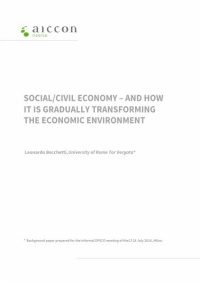Social/Civil Economy – And how it is Gradually Transforming the Economic Environment
Abstract
The crisis we are living is multifaceted as it affects at least five (economic, financial, environmental, currency-related and wellbeing-related) dimensions. As such it requires solutions which address simultaneously the different sides of the problem. The economic system as it has been conceived so far (a sum of purely self-interested actions from individuals and companies which should be transformed into social optimum by the invisible hand of the market and the “visible hand” of benevolent, perfectly informed and not captured institutions) seems unable to solve the problem at stake due to three (anthropological, corporate and value) reductionisms which are at the root of the global financial crisis and erode the social capital which is a fundamental resource for its solution.
In this paper we outline how the emergence of the social/civil economy within a corporate “biodiversity” framework may provide a structural solution to it, giving fundamental contribution to the pursuit of sustainable development with high employment levels and social cohesion. The key difference in the new emerging paradigm is the hybridation of corporate and individual (consumer/investor) behavior. In the present paper we document how the shift in paradigm has already started since a significant minority of companies and citizens is progressively internalizing social environmental externalities in their choices, consistently with a mix of standard and longsighted self-interested behaviour and pro-social preferences.
In the paper we describe some features of the new actors of social/civil economy (old and new cooperative forms, impact investors, multistakeholder for profit companies, fair trade, SR investment funds and banking, etc.) and outline some key policy issues (tax rules, procurement rules, development of information intermediaries) which will be crucial to fully exploit the potential of the new paradigm.
*Background paper prepared for the informal EPSCO meeting of the17-18 July 2014, Milan.

